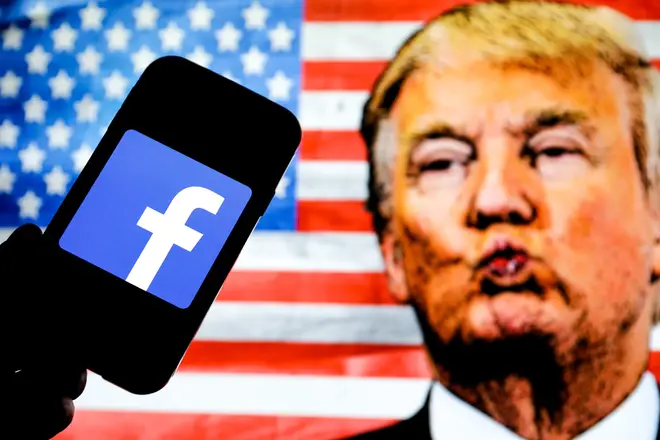
Richard Spurr 1am - 4am
8 January 2021, 18:22 | Updated: 8 January 2021, 19:07

Things must be really screwed up when Facebook’s founder, Mark Zuckerberg has to protect Americans from their own president.
He posted a message in front of more than 2 billion users of Facebook and Instagram that told them he had chosen to indefinitely ban the Leader of the Free World because “the risks of allowing the President to continue during this period are too bad.”
Right now, Trump still has the power to order a nuclear strike, but he’s unable to post a comment on a James O’Brien Facebook rant.
Be under no illusion – both social media and traditional media outlets have caused much of this week’s events.
Read more: Donald Trump says he will not attend Joe Biden's Inauguration
Trump has carefully pulled together the disenfranchised, the susceptible and vehement anti-democrats to create his rabble, fuelled by fake news and misinformation and encouraged by his lies.
His fall in grace was both surprising and sudden. From a temporary 12-hour Twitter ban – he found himself silenced on all major platforms, even Twitch – a gaming streaming service owned by Amazon, where the President had an official account.

LBC Washington DC Correspondent reports from Capitol Hill
It wasn’t just social networks that piled in on the pres – Shopify, who provide online retail services, pulled the plug on Trump’s online merch store, the place where he made untold money from flogging MAGA hats and “Stop the Steal” hoodies to those gleefully lapping them up, despite having let the shop run unrestricted for years.
Did the tech companies suddenly develop a spine, after spending years enabling Trump? As a huge advocate and supporter of all the good that technology and the social networks bring to our lives, it’s still a real challenge to clearly explain just what’s going on.
Read more: Donald Trump banned from Facebook until end of Presidency
If tech companies are finally taking a moral responsibility for what's being published on their platforms, the world's most powerful man is a lofty place to start.
There's a variety of reasons why they might finally have stood up to the President - it could be the fact that Trump’s use of social media clearly cost people’s lives as he stirred up his own low-rent revolution - and provided historical images of a man in a horned-hat looking like Jamiroquai on energy drinks marauding around congress.
While the pandemonium was unfolding, the transfer of power to Joe Biden was finally confirmed, and while regulation of tech companies didn’t appear to be high on his list of priorities, many of these businesses must surely be hoping their actions might pay favour with the inbound administration?
So, what’s next for Trump? With the chances of running for presidency in 2024 now in tatters, is he set for a return to selling “the world’s greatest steaks” (https://www.youtube.com/watch?v=LyONt_ZH_aw) or will he double-down on enabling and building the fringe community social media helped create?
For the social networks, the problem of “what to do with Donald” actually begins when he is no longer US President. Will he be allowed to keep those huge followings he amassed as the world's most powerful man, or will he remain without their platform?
Even if mainstream platforms like Facebook and YouTube don't openly welcome him back, emerging services like Parler, which describes itself as the "free speech social network" will pick up Trump's audience of the disaffected in droves.
With the US government already considering a break up of Facebook for its dominance in social media in 2021, the world of tech could be an even bigger rollercoaster than was predicted.